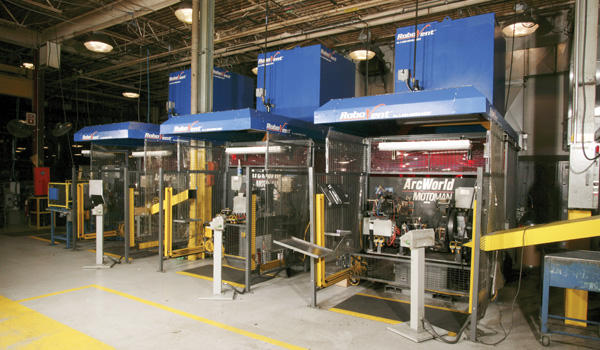Keeping It Clean
February 12, 2010
Nearly two years ago, the Metaldyne Tubular Products plant in Hamburg, Michigan faced a dilemma present in many forming, fabricating and welding plants. What to do about weld smoke? Effectively capture and filter it at the source with an investment in new technology that yields a cleaner plant, or continue using older or outdated filtering equipment and continue to pay for regular plant cleanings.
At Metaldyne Tubular Products, the decision was made based upon a simple observation and a company policy to always look for ways to raise the bar and improve operations, according to Butch Bennett, Program Manager at Metaldyne Tubular. “Our air quality reports were very favorable but our plant walls and machinery were getting dirty,” he said.
Metaldyne Tubular Products management made a decision to invest in new air filtration equipment to help improve employee comfort, keep the plant cleaner and save money on plant cleaning expenses, and that’s what they did beginning in 2001. But it was a long, difficult process.
Metaldyne Tubular Products is a tubular fabrication plant with more than 400 employees working three shifts. Metaldyne Tubular manufactures exhaust systems for auto companies, a process that involves a great deal of manual (27 cells) and robotic (49 cells) welding to join together pieces of stainless steel tubing. Metaldyne makes exhaust systems for Ford, GM, Chrysler, AM General, International, and some governmental contracts.
Up until a year ago, Metaldyne Tubular used electrostatic exhaust and filtering systems to clean the air in the plant with mixed results. Electrostatic units collect smoke but do not filter it effectively because they do not remove all of the particles of the smoke. These particles get returned to the airflow in the plant and stick to walls, ceilings and equipment. In effect, the electrostatic units were energizing the smoke particles and causing them to stick to everything in the plant.
“Air quality was a mixed concern within the plant,” Bennett said. The air inside the Metaldyne Tubular Plant always tested well below the OSHA minimums, however a handful of employees were concerned about air quality in the plant, as the equipment became dirty over time. Bennett also said that the health and safety professionals at the plant did receive some employee questions about the air quality inside the plant. While the numbers indicated the air quality was more than acceptable, Metaldyne Tubular management still felt there was an overall cleanliness problem.
They assembled a team of people to look at other air filtration and air cleaning systems, which included Bennett, Roger Braun, Process Engineer, Stephen Stouffer, Maintenance Leader, and Sue Martin, Health & Safety Coordinator. The team made the decision to take the time to research the options available and to upgrade gradually as new programs came on line and needed to be fitted with air filtration equipment.
“It’s been a long, hard effort to change to something different,” Bennett said of the move to new filtration equipment. The team got a boost in their search for air filtration equipment while they were researching welding robots. As they visited other plants to research and evaluate Motoman robotic welding cells, they noticed that many of the Motoman robots were fitted with RoboVent® air filtration systems from RoboVent Product Group of Clawson, Michigan.
The team subsequently visited other plants outfitted with air filtration systems from RoboVent Product Group and did some additional study on the RoboVent approach to air filtration. RoboVent Product Group manufactures a variety of air filtration products, including the RoboVent, a selfcontained air filtering system for robotic welding cells. RoboVent develops and manufactures air filtration systems for many different industries and types of manufacturing. What the team learned about RoboVent helped steer them toward using RoboVent products.
“The electrostatic system was good 10-15 years ago, but it’s less effective compared to what’s available now,” Bennett said. “Specifically, the collection system used in the RoboVent is much more adept at collecting weld smoke. To change, we knew we had to do something different and we knew we had to go in a different direction.”
Next, the Metaldyne team and RoboVent began the gradual process of outfitting the Metaldyne Tubular plant with RoboVent units as they added new production lines and new robotic welding cells. They also asked RoboVent to re-fit 21 of the existing electrostatic systems with new, customized RoboVent filtering systems to remove weld smoke that was not being filtered by the electrostatic systems.
Currently, Metaldyne Tubular has RoboVent units above 14 robotic welding cells in addition to the refitted electrostatic filtering systems. They also rely on a RoboVent Product Group preventative maintenance program to keep the air filtration equipment running efficiently and to ease the burden on Metaldyne maintenance personnel. Their investment is beginning to pay off.
“Employees have noticed a difference, particularly in the winter time when the plant was closed up, Bennett said. “The plant had much fresher air”. In addition, the air inside the Metaldyne Tubular plant continues to test well below OSHA minimums and the plant is being thoroughly cleaned now that the air is free of much of the particles that were sticking to the plant’s walls and equipment.
Bennett says that the management team at Metaldyne Tubular Products is very pleased with the decision to clean the plant’s air and the results they have achieved. “The main reason we chose to make the investment in the air filtration and cleaning systems was to keep the plant clean. With that comes a lot benefits. The plant stays bright and clean and that has some positive affects health-wise on the employees.”
After all, Bennett explained, “They’re here as much as I’m here.”
